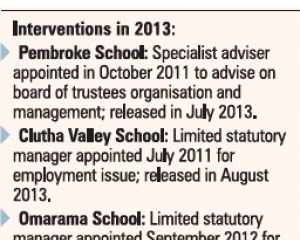Otago principals appear to hold mixed views about whether the Education Amendment Act 2012, which came into force on January 1, will be helpful or more of a hindrance.
The legislation was passed in Parliament in June 2013, amending the Education Act 1989, and now gives appropriate school staff the power to search pupils and their bags and to seize property.
It also gives schools more protection from potential lawsuits in relation to search and seizure, protections which previously were not spelled out.
In the past, schools either had to take the risk they might be acting in breach of the New Zealand Bill of Rights provision on search and seizure, or call in the police.
Much of the content of the Act was prompted by events from New Zealand and overseas regarding antisocial behaviour in schools, including theft, cyberbullying, violence, self-harm and others, drug supply and use, and weapon supply and use.
The new legislation has been somewhat problematic as the Bill of Rights Act has, to some parties, been in direct contrast to the search and seizure provisions of the Amendment Act 2012.
Secondary Principals' Association of New Zealand (Spanz) president Tom Parsons said the resulting discussions over the individual rights of a pupil, as opposed to the greater good for the greatest number, had intensified.
He believed it was an age-old debate which was likely to continue long after the present generation of educators was gone.
Otago Secondary Principals' Association president Rick Geerlofs was cautious about the legislation.
''The way the Act is written, it would appear that the rights of an individual will be more important than the rights of the greater majority.
''I think the spirit of the Act is good, but it will be difficult for schools to implement.
''The new legislation has perhaps complicated procedures in schools around search and seizures.
''Secondary principals are very cautious about how it will be implemented.''
Otago Primary Principals' Association president Stephanie Madden was more optimistic about the legislation.
''For primary schools, there is not likely to be a great change in how we operate.
''However, the new legislation will provide some clarity around what we can and can't do.
''Unfortunately, principals are often faced with challenging behavioural situations where we have to balance the rights of individual students with maintaining a safe environment for our pupils and staff.''
In a bid to ensure seamless application, the Ministry of Education has developed rules and guidelines in consultation with the education sector, to help schools correctly conduct searches and monitor the surrender and retention of property.
Mrs Madden said Secretary for Education Peter Hughes assured principals at an Otago Primary Principals' Association annual meeting late last year the ministry would be working closely with school leaders to ensure guidelines were workable and practical for schools.
''It will be vital that these guidelines allow principals to take the correct course of action to keep their students and staff safe,'' she said.
Mr Parsons agreed. He believed it would avoid further controversy, complexity and legal risk to schools, while achieving the desired result of clear and effective guidelines aimed at interpreting the Act to truly assist schools in litigious and contentious areas.
Advertisement






